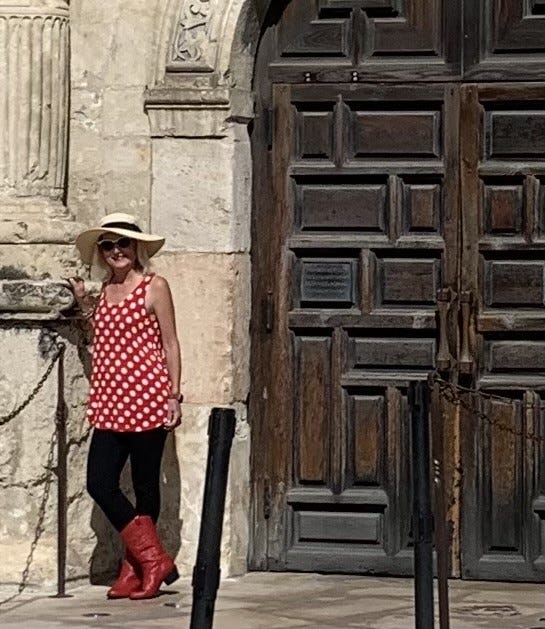My high school English teacher, Mrs. Case, had shiny black hair, which she wore in a neat bun held tight by a pencil. Her wardrobe — white tailored blouses, dark pencil skirts, and black heels — spoke of professionalism, confidence, and no-nonsense teaching. At least, that’s how I remember her. If the term “English teacher” were listed in an illustrated dictionary, a photo of Mrs. Case would be next to the definition. She taught me to appreciate literature: Shakespeare, Homer, and Dickens. When she read George Eliot’s Silas Marner aloud, I gave her my full attention. I identified with Silas and his desire to make good on the evil inflicted upon him. Who wouldn’t say yes to that?
I even enjoyed Mrs. Case’s grammar lessons — until the day she taught present and past participles. Participles are two of the four verb forms; the other two are the present form and the past form: laugh-laughed, sing-sung, eat-ate.
I had no trouble recognizing present participles, which are verbs ending in -ing (am laughing; am singing; am eating); and even past participles were understandable — regular verbs often ending in -ed (have laughed, have sung, have eaten).
However, what I couldn’t get past was the term participle. Mrs. Case should have explained it to us obsessive learners. When no explanation came, I allowed my thoughts to wander back to Eppie, Silas Marner’s ward, and how she deserved to find happiness and marry Aaron, the boy she loved. This was a much better use of my time than trying to understand participles.
After all these years, I’ve decided it’s high time I overcame the mental block I have against this term. I find it helps in situations like this to understand a term’s origin. This strategy works for me for everything except for math, for which only a brain transplant would suffice. If I have a math question, I ask my sister, who is a math teacher, or my husband, who knows everything except how to dust.
Day One: My self-tutoring begins with my reading the definition of participle in an old English grammar book I found on my bookshelf. I dare you to do this. The pain between my eyes started somewhere around the fifth definition. After two hours, I was more confused than when I began. What sunk in was that participles come with a lot of baggage. I needed a break. Besides, it was time to make crab cakes, a process that begins with opening a bottle of wine.
Day Two: Clarity comes with a new day, fresh coffee, and a strong determination to keep things simple. The Latin definition of participle means “to share” or “participate.” Merriam-Webster’s definition of the word is “a form of a verb that is used to indicate a past or present action and that can also be used like an adjective.” The Oxford American Dictionary agrees with M-W, with the addition of “used to make compound verbs.” Very nice, but I wanted more information and a simpler definition. Here it is in a nutshell:
A participle can take the present form, recognizable by its -ing ending, or the past form with the -ed ending if it is a regular verb. Irregular verbs, such as bought, rung, or caught, have their own form.
Participles are also modifiers (adjectives that describe nouns or adverbs that describe verbs): But if the word the participle is meant to modify is not present, it is referred to as a dangling participle, or dangling modifier, which attaches itself to — or modifies — the nearest subject.
Confused? Here are some examples:
Jogging down the trail, the rain clouds appeared on the horizon.
Jogging down the trail modifies the runner, but since a runner is not mentioned, this dangling modifier makes it sounds like the rain is jogging down the trail. Correctly written, this sentence would be: Jogging down the trail, the runner noticed the rain clouds on the horizon.
Trying to get to sleep, the raucous party next door kept me awake.
This sentence sounds like the party guests were trying to get to sleep. Correctly written:
Trying to get to sleep, I was kept awake by the raucous partiers next door.
Smothered in gravy and cranberry sauce, my grandmother enjoyed her turkey and dressing.
My grandmother never smothered herself with gravy and cranberry sauce (at least not that I know of), so this sentence should read:
My grandmother enjoyed her turkey and dressing smothered in gravy and cranberry sauce.
Washing the dishes, the chipped glass cut my hand.
The chipped glass was not washing the dishes, I was. So the correct sentence here would read:
Washing the dishes, I cut my hand on the chipped glass.
Of course, there’s a lot more to what participles can do and the different forms (alas, more baggage) they take, but I’ll save that for another writing tip. Or not. Sorry, Mrs. Case.

Look for Murder at the Pontchartrain, book six, in the Sydney Lockhart Mystery Series, out this summer. For everyone who preorders a copy of Murder at the Pontchartrain, I will give you a sneak preview of all the places Sydney ends up while she’s in the Big Easy. And if you know Sydney, you know she’s not seeing the sights on a streetcar with the other tourists.

https://anamcara-press.com/product/murder-at-the-ponchartrain/


I loved this post! Thank you for giving me a grammar lesson which was sorely needed. I’m walking away from this post significantly less confused. I think Mrs. Case would be proud! 😆
Thanks, Damyanti!